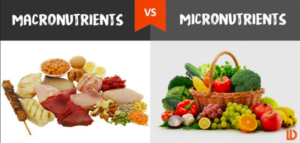No products in the cart.
Food and Nutrition
The human body is like an engine. And just like every engine, it needs fuel, in the form of food. We get the energy needed to sustain ourselves through food. Hence, Food and Nutrition play a major role in our lives and let’s get to know them better.
There are a lot of nutrients in the diet we consume, but they can be broadly broken down into six categories-
- Carbohydrates (or carbs)
- Fats
- Proteins
- Vitamins
- Minerals
- Fibre
Nutrients can be broken down into 2 types-
Micronutrients- They are required in minute quantities (usually less than 0.5 grams a day). They are of two types- vitamins and minerals. High quantities of them can be fatal to the body, but getting lower amounts that recommended is also unhealthy, and can cause deficiency.
Macronutrients- They are required in higher amounts. Most of the other nutrients are macronutrients, like fats, carbohydrates and proteins. Their daily recommended usage is well over 50 grams a day.

Vitamins- They are complex chemical compounds that provide a range of benefits like providing immunity against diseases, preventing cancer, and helping the body to metabolise proteins and carbohydrates. They are referred to by letters, like Vitamin A, Vitamin B to Vitamin K. The most famous vitamin is Vitamin C, also known as ascorbic acid, found in citrus fruits like lemons and oranges. The are found typically in fruits and vegetables, so be sure to include them in your diet!!

Minerals- They are usually simple chemical elements needed for efficient functioning of the body, like Iron, Calcium, Sulphur, Manganese, Phosphorus etc. They strengthen the bones and teeth, and increase immunity by facilitating greater WBC production. They are found in vegetables, as well as in animal products like milk and eggs. However they are not common in cereals, which forms the bulk of Indian diet

Proteins- The most common nutrient associated with ‘healthy foods’ (albeit misleading. Every nutrient is necessary, even fats!). They are responsible for repairing the tiny muscle damages that occur during the day to day functioning of a human, and hence are also called the building blocks of the body. We need 1 gram protein per kg of body weight. So if you are 70 kg, have 70 grams of protein a day!! They are typically found in legumes and animal products. Vegetarians should be especially careful, as due to no animal products, the vast majority of vegetarians are protein deficient (over 80% in India!!!) https://www.business-standard.com/article/pti-stories/indian-vegetarian-diets-84-protein-deficient-ida-118072400896_1.html

Carbohydrates- They are the major source of energy for our body. They give 4 calories of energy (the basic unit of energy) per gram. Sugars are a form of carbohydrates too. They are often vilified, but they are actually needed in the largest quantity, with most humans needing upwards of 300 grams a day (compared to 60-70 g for proteins, 60-80 g for fats, and less than 1 g for vitamins and minerals). A deficit of carbs is harmful, but we should be careful to take healthy carbohydrates like atta and rice instead of chips and coke.

Fats- They are a more energy dense form of food, with 1 gram providing 9 calories, more than twice that of carbohydrates. However they are slow metabolising nutrients, so the energy is released in a gradual manner. Hence usually they are filling for a longer time than carbohydrates. Healthiest sources of fats are almonds and eggs. Contrary to popular belief, the milk fats are bad for health, due to being saturated, and hence should be avoided as much as possible. Yes, that includes the ghee AND butter filled aloo paratha!

Fibre- It isn’t processed by the body, and is passed undigested. Still I felt it necessary to mention here because it ensures smooth functioning of bowel movement, and since it stays undigested for long periods of time in the colon, it satiates hunger, so you don’t munch on burgers every other hour!

For Science related videos : https://www.youtube.com/c/ExperiHub?sub_confirmation=1
For more Science related blogs : https://experihub.com/did-you-know/
